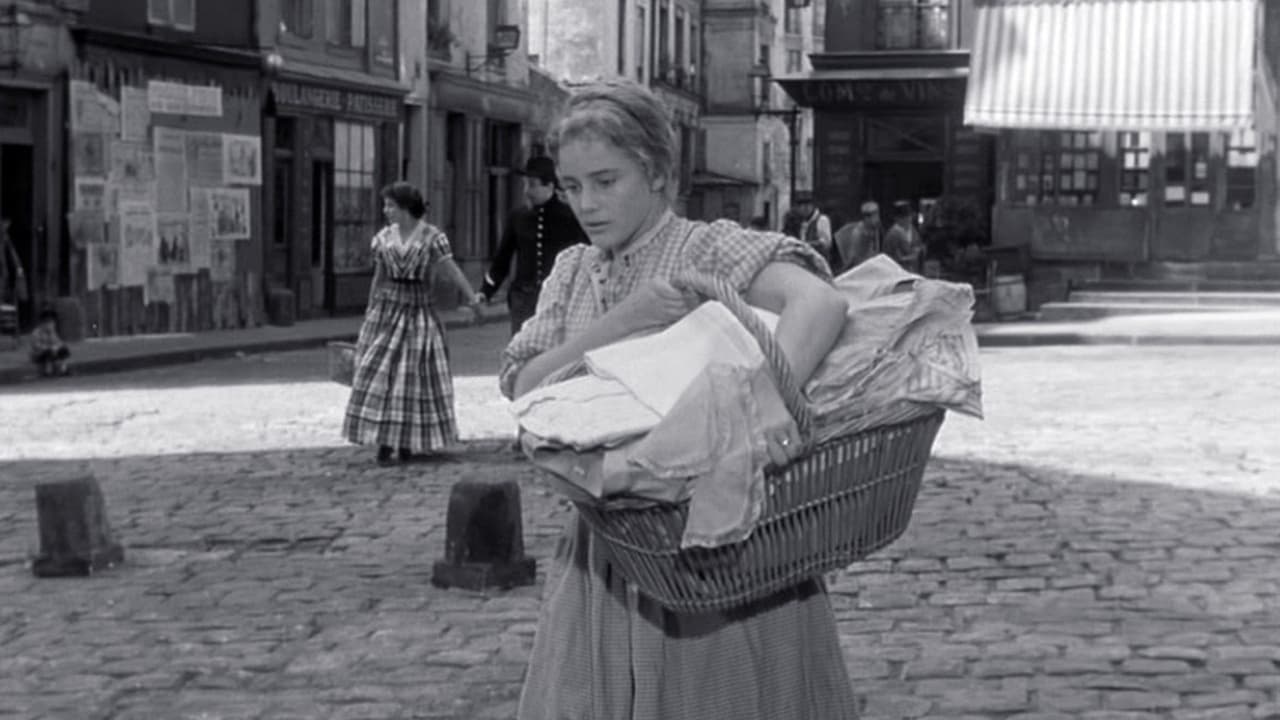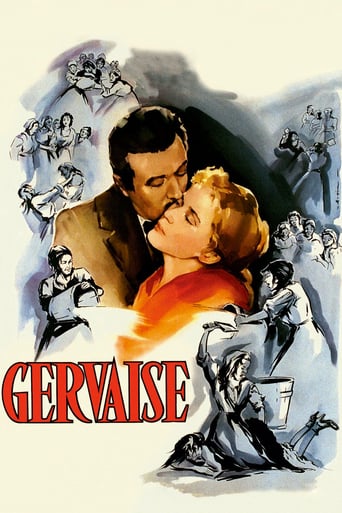NekoHomey
Purely Joyful Movie!
Catangro
After playing with our expectations, this turns out to be a very different sort of film.
Brendon Jones
It’s fine. It's literally the definition of a fine movie. You’ve seen it before, you know every beat and outcome before the characters even do. Only question is how much escapism you’re looking for.
Sammy-Jo Cervantes
There are moments that feel comical, some horrific, and some downright inspiring but the tonal shifts hardly matter as the end results come to a film that's perfect for this time.
kidboots
I've always felt "La Assommoir" by Zola, the most depressing, heart wrenching book I have ever read. It was almost as if Zola was saying, if you are decent, hard working and try to better yourself and you are a woman, your life will be paved with misery. It is one book I have never been able to reread. Initially, in the book Gervaise is seen as a lovely young mother determined to do her best at honest work for her children as her horrible lover leaves her to escape family responsibility. She meets a roofer Henri, who worships her - and it is all down hill from there. In keeping with Zola's character tie-ins (most of his books were linked), one of her children is Nana, the subject of Zola's most acclaimed book. For some strange reason I felt drawn to the movie - I wanted to see if there was any hope or brightness that I had missed in the book.This amazing movie starts with a burst of life - a huge fight in the laundry among hot, sudsy buckets of water between Gervaise and Virginie, the sister of the woman who has run off with Gervaise's lover, Lanier, with whom she has had two children. The viciousness and the brutality of the fight is shocking. Gervaise is triumphant, but it is one of the last times she does triumph.Eventually Gervaise marries - to a good man Henri, who adores her and they eventually have a little girl, Nana. There is also another Zola reference to Therese Raquin, when Henri's sister comments on Gervaise's striking resemblance to Therese "the one who died of consumption". Gervaise longs to have her own laundry but on the day her dreams are to be realised Henri has a horrible accident. He falls off a roof and because of Gervaise's insistence on nursing him herself (instead of taking him to the free hospital) it takes all their savings and prolongs his recovery to six months. At the end of which Henri is a hopeless alcoholic and permanently unemployable. Through the efforts of their good friend Goujet,a blacksmith (who is in love with Gervaise) she is able to open her own laundry but Henri when he is not being a nuisance in the shop, has taken to pawning the laundry items for drinking money. This is the beginning of the end - Virginie comes back to the street with her husband Mr. Fish, who is a policeman and even though she warmly embraces Gervaise and wants to put the fight behind them, she is a false friend and a troublemaker. Lanier then turns up and the drunken Henri makes a companion of him, even inviting him to take up residence with them as a permanent boarder. Definitely not as black as the book which goes into minute detail of Gervaise's descent into drunkenness, even ending with her living in the tiny closet that Old Bru lived in. During this time Goujet has gone to prison for inciting the impoverished workers to fight for an extra 5 cents a week. When he comes out and sees the living arrangements between her and Henri and Lanier, he wants nothing more to do with her but agrees to take on her eldest son as an apprentice. The film ends with Gervaise sitting numbly in the tavern while Nana, now a child of the streets, makes herself pretty with grubby ribbons. Maria Schell is just perfect, exactly how I imagined Gervaise would be but for a more uplifting Zola book I would recommend "Ladies Delight", about a young woman who works her way up (virtuously!!) to a powerful position in a department store.
MARIO GAUCI
Acclaimed film from Emile Zola's "L'Assomoir": typical of French art-house cinema, it's meticulously-detailed, technically proficient and splendidly acted – however, the main plot of a crippled woman whose ambitions to open her own laundry business are hampered by a complex love life isn't exactly thrilling. Still, one can certainly understand the multitude of international prizes the film won or was nominated for at the time of its release.In fact, Gervaise (German actress Maria Schell in a luminous performance) is involved throughout with a philandering ne'er-do-well (who fathered her two elder children), her husband – splendidly portrayed by Francois Perier – who loses his job after falling off a roof and subsequently takes to drink (with whom she has another kid) and a young political activist (who gets thrown into jail)! The woman has a similarly ambivalent relationship with her husband's family and the neighbors in the poor quarter where she lives – especially the sister (played by a reptilian Suzy Delair) of the woman with whom her first lover eloped. They have a big fight in the washing centre of town (which even involves some surprising split-second nudity) but, when they meet again, both are willing to bury the hatchet (Delair having married the local police constable)...that is, until the lover himself reappears! Ironically, Perier and his rival become friends (they even look alike!) and the former eventually contrives to have the latter lodge with them!! Ultimately, though, Perier's drinking problem escalates to the point where he becomes an embarrassment to his wife (admirably, the director does not shy away from showing his vomit-soaked pillow at one point!) and, in a fit of rage, destroys her shop; this harrowing sequence culminates in him being taken away by hospital attendants bruised and raving (in fact, he dies shortly afterwards). Equally depressing, however, is the ending – which finds Schell destitute (having sold the shop to Delair, now in cahoots with her former lover) and herself a frequent customer of the local tavern!; no longer able to care for her youngest daughter, the latter is forced to look out for herself – which she does with naïve optimism.I have two more titles by the underrated Clement in my unwatched VHS/DVD pile – JOY OF LIVING (1960) and IS Paris BURNING? (1965) – as well as another highly regarded French film starring Maria Schell – Alexandre Astruc's UNE VIE (1958; though available only in its original language)...
dbdumonteil
Why Maria Schell?If you have read Zola's masterpiece -"l'assommoir" the seventh of the Rougon Macquart saga,and one of the finest, surpassed only by "Germinal"- ,you wonder why Clement chose her when the part was tailor made for Simone Signoret.On the other hand ,Suzy Delair was the ideal Virginie Poisson,hypocrite venomous and vile .They say her buttocks were "dubbed" (by Liliane Montevecchi's) during the famous scene of the spanking ! René Clément did a good job even if his adaptation seemed sometimes tame and timid .Zola's depictions are so intense that it's hard to transfer them to the screen.But the " fête de Gervaise " ,with the gargantuan meal comes close to fully recreate it,and it was not easy since in the book it spreads over about twenty pages.Despise some reservations,this is an unqualified must for good cinema lovers.
Lafleurette
This is one of the best movie I've ever seen. Maria Schell is beautiful and hearthbreaking.I am not surprised it won the best foreign film of 1956. Suzy Delair is terrific and Francois Perier is superb. I will never forget this movie. It touched me deeply.

